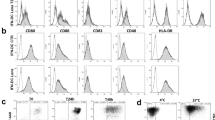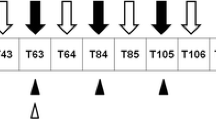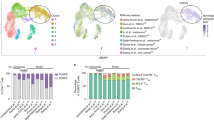Abstract
Follicular lymphoma (FL) is a remarkably immune-responsive malignancy, which is still considered incurable. As, standard immunochemotherapy is complex, toxic and not curative, improvement in FL care is now a crucial topic in hemato-oncology. Recently, we and others have shown that dendritic cell (DC)-based therapies allow a specific immune response associated with sustained lymphoma regression in a proportion of low-tumor burden FL patients. Importantly, the rate of objective clinical response (33–50%) and of sustained remission is remarkably higher compared to similar studies in solid tumors, corroborating the assumption of the immune responsiveness of FL. Our experimental intra-tumoral strategy combined injection with rituximab and interferon-α-derived dendritic cells (IFN-DC), a novel DC population particularly efficient in biasing T-helper response toward the Th1 type and in the cross-priming of CD8 + T cells. Noteworthy, intra-tumoral injection of DC is a new therapeutic option based on the assumption that following the induction of cancer-cell immunogenic death, unloaded DC would phagocytize in vivo the tumor associated antigens and give rise to a specific immune response. This approach allows the design of easy and inexpensive schedules. On the other hand, advanced and straightforward methods to produce clinical-grade antigenic formulations are currently under development. Both unloaded DC strategies and DC-vaccines are suited for combination with radiotherapy, immune checkpoint inhibitors, immunomodulators and metronomic chemotherapy. In fact, studies in animal models have already shown impressive results, while early-phase combination trials are ongoing. Here, we summarize the recent advances and the future perspectives of DC-based therapies in the treatment of FL patients.


Similar content being viewed by others
Abbreviations
- DC:
-
Dendritic cells
- FL:
-
Follicular lymphoma
- GM-CSF:
-
Granulocyte macrophage colony-stimulating factor
- ICI:
-
Immune checkpoint inhibitor
- IFN-DC:
-
IFN-α-conditioned dendritic cells
- IFN-α:
-
Interferon alpha
- IFN-γ:
-
Interferon gamma
- IL-4-DC:
-
Interleukine-4
- KLH:
-
Keyhole limpet hemocyanin
- LTB:
-
Low tumor burden
- NHL:
-
Non-Hodgkin lymphoma
- NK:
-
Natural killer
- NOD-SCID:
-
Non-obese diabetic/severe combined immunodeficiency
- PBL:
-
Peripheral blood lymphocytes
- Relapsed/Refractory:
-
RR
- TNF-α:
-
Tumor necrosis factor alpha
- Treg:
-
Regulatory T cells
- TAA:
-
Tumor associated antigens
References
Freedman A (2018) Follicular lymphoma: 2018 update on diagnosis and management. Am J Hematol 93:296–305. https://doi.org/10.1002/ajh.24937
Ardeshna KM, Qian W, Smith P et al (2014) Rituximab versus a watch-and-wait approach in patients with advanced-stage, asymptomatic, non-bulky follicular lymphoma: an open-label randomised phase 3 trial. Lancet Oncol 15:424–435. https://doi.org/10.1016/S1470-2045(14)70027-0
Bachy E, Seymour JF, Feugier P et al (2019) Sustained progression-free survival benefit of rituximab maintenance in patients with follicular lymphoma: long-term results of the prima study. J Clin Oncol 37:2815–2824. https://doi.org/10.1200/JCO.19.01073
Marcus R, Davies A, Ando K et al (2017) Obinutuzumab for the first-line treatment of follicular lymphoma. N Engl J Med 377:1331–1344. https://doi.org/10.1056/NEJMoa1614598
Casulo C, Nastoupil L, Fowler NH et al (2017) Unmet needs in the first-line treatment of follicular lymphoma. Ann Oncol Off J Eur Soc Med Oncol 28:2094–2106. https://doi.org/10.1093/annonc/mdx189
Hiddemann W, Barbui AM, Canales MA et al (2018) Immunochemotherapy with obinutuzumab or rituximab for previously untreated follicular lymphoma in the gallium study: influence of chemotherapy on efficacy and safety. J Clin Oncol 36:2395–2404. https://doi.org/10.1200/JCO.2017.76.8960
Freeman CL, Kridel R, Moccia AA et al (2019) Early progression after bendamustine-rituximab is associated with high risk of transformation in advanced stage follicular lymphoma. Blood 134:761–764. https://doi.org/10.1182/blood.2019000258
Maddocks K, Barr PM, Cheson BD et al (2017) Recommendations for clinical trial development in follicular lymphoma. J Natl Cancer Inst. https://doi.org/10.1093/jnci/djw255
Morschhauser F, Fowler NH, Feugier P et al (2018) Rituximab plus lenalidomide in advanced untreated follicular lymphoma. N Engl J Med 379:934–947. https://doi.org/10.1056/NEJMoa1805104
Chiu H, Trisal P, Bjorklund C et al (2019) Combination lenalidomide-rituximab immunotherapy activates anti-tumour immunity and induces tumour cell death by complementary mechanisms of action in follicular lymphoma. Br J Haematol 185:240–253. https://doi.org/10.1111/bjh.15797
Bogen B, Ruffini P (2009) Review: to what extent are T cells tolerant to immunoglobulin variable regions? Scand J Immunol 70:526–530. https://doi.org/10.1111/j.1365-3083.2009.02340.x
Schuster SJ, Neelapu SS, Gause BL et al (2011) Vaccination with patient-specific tumor-derived antigen in first remission improves disease-free survival in follicular lymphoma. J Clin Oncol 29:2787–2794. https://doi.org/10.1200/JCO.2010.33.3005
Levy R, Ganjoo KN, Leonard JP et al (2014) Active idiotypic vaccination versus control immunotherapy for follicular lymphoma. J Clin Oncol 32:1797–1803. https://doi.org/10.1200/JCO.2012.43.9273
Wculek SK, Cueto FJ, Mujal AM et al (2019) Dendritic cells in cancer immunology and immunotherapy. Nat Rev Immunol. https://doi.org/10.1038/s41577-019-0210-z
Wimmers F, Schreibelt G, Sköld AE et al (2014) Paradigm shift in dendritic cell-based immunotherapy: from in vitro generated monocyte-derived DCs to naturally circulating DC subsets. Front Immunol 5:165. https://doi.org/10.3389/fimmu.2014.00165
Santini SM, Lapenta C, Logozzi M et al (2000) Type I interferon as a powerful adjuvant for monocyte-derived dendritic cell development and activity in vitro and in Hu-PBL-SCID mice. J Exp Med 191:1777–1788. https://doi.org/10.1084/jem.191.10.1777
Santini SM, Lapenta C, Santodonato L et al (2009) IFN-alpha in the generation of dendritic cells for cancer immunotherapy. Handb Exp Pharmacol. https://doi.org/10.1007/978-3-540-71029-5_14
Parlato S, Santini SM, Lapenta C et al (2001) Expression of CCR-7, MIP-3beta, and Th-1 chemokines in type I IFN-induced monocyte-derived dendritic cells: importance for the rapid acquisition of potent migratory and functional activities. Blood 98:3022–3029. https://doi.org/10.1182/blood.v98.10.3022
Cox MC, Castiello L, Mattei M et al (2019) Clinical and antitumor immune responses in relapsed/refractory follicular lymphoma patients after intranodal injections of IFNα-dendritic cells and rituximab: a phase I clinical trial. Clin Cancer Res 25:5231–5241. https://doi.org/10.1158/1078-0432.CCR-19-0709
Stroncek DF, Basil C, Nagorsen D et al (2005) Delayed polarization of mononuclear phagocyte transcriptional program by type I interferon isoforms. J Transl Med 3:24. https://doi.org/10.1186/1479-5876-3-24
Korthals M, Safaian N, Kronenwett R et al (2007) Monocyte derived dendritic cells generated by IFN-alpha acquire mature dendritic and natural killer cell properties as shown by gene expression analysis. J Transl Med 5:46. https://doi.org/10.1186/1479-5876-5-46
Lapenta C, Santini SM, Spada M et al (2006) IFN-alpha-conditioned dendritic cells are highly efficient in inducing cross-priming CD8(+) T cells against exogenous viral antigens. Eur J Immunol 36:2046–2060. https://doi.org/10.1002/eji.200535579
Spadaro F, Lapenta C, Donati S et al (2012) IFN-α enhances cross-presentation in human dendritic cells by modulating antigen survival, endocytic routing, and processing. Blood 119:1407–1417. https://doi.org/10.1182/blood-2011-06-363564
Lattanzi L, Rozera C, Marescotti D et al (2011) IFN-α boosts epitope cross-presentation by dendritic cells via modulation of proteasome activity. Immunobiology 216:537–547. https://doi.org/10.1016/j.imbio.2010.10.003
Santini SM, Lapenta C, Donati S et al (2011) Interferon-α-conditioned human monocytes combine a Th1-orienting attitude with the induction of autologous Th17 responses: role of IL-23 and IL-12. PLoS ONE 6:e17364. https://doi.org/10.1371/journal.pone.0017364
Lapenta C, Donati S, Spadaro F et al (2016) NK cell activation in the antitumor response induced by IFN-α dendritic cells loaded with apoptotic cells from follicular lymphoma patients. J Immunol 197:795–806. https://doi.org/10.4049/jimmunol.1600262
Bandola-Simon J, Roche PA (2019) Dysfunction of antigen processing and presentation by dendritic cells in cancer. Mol Immunol 113:31–37. https://doi.org/10.1016/j.molimm.2018.03.025
Timmerman JM, Czerwinski DK, Davis TA et al (2002) Idiotype-pulsed dendritic cell vaccination for B-cell lymphoma: clinical and immune responses in 35 patients. Blood 99:1517–1526. https://doi.org/10.1182/blood.V99.5.1517
Di Nicola M, Zappasodi R, Carlo-Stella C et al (2009) Vaccination with autologous tumor-loaded dendritic cells induces clinical and immunologic responses in indolent B-cell lymphoma patients with relapsed and measurable disease: a pilot study. Blood 113:18–27. https://doi.org/10.1182/blood-2008-06-165654
Zappasodi R, Bongarzone I, Ghedini GC et al (2011) Serological identification of HSP105 as a novel non-Hodgkin lymphoma therapeutic target. Blood 118:4421–4430. https://doi.org/10.1182/blood-2011-06-364570
Zappasodi R, Pupa SM, Ghedini GC et al (2010) Improved clinical outcome in indolent B-cell lymphoma patients vaccinated with autologous tumor cells experiencing immunogenic death. Cancer Res 70:9062–9072. https://doi.org/10.1158/0008-5472.CAN-10-1825
Selenko N, Majdic O, Draxler S et al (2001) CD20 antibody (C2B8)-induced apoptosis of lymphoma cells promotes phagocytosis by dendritic cells and cross-priming of CD8+ cytotoxic T cells. Leukemia 15:1619–1626. https://doi.org/10.1038/sj.leu.2402226
Franki SN, Steward KK, Betting DJ et al (2008) Dendritic cells loaded with apoptotic antibody-coated tumor cells provide protective immunity against B-cell lymphoma in vivo. Blood 111:1504–1511. https://doi.org/10.1182/blood-2007-03-080507
Kolstad A, Kumari S, Walczak M et al (2015) Sequential intranodal immunotherapy induces antitumor immunity and correlated regression of disseminated follicular lymphoma. Blood 125:82–89. https://doi.org/10.1182/blood-2014-07-592162
Hammerich L, Marron TU, Upadhyay R et al (2019) Systemic clinical tumor regressions and potentiation of PD1 blockade with in situ vaccination. Nat Med 25:814–824. https://doi.org/10.1038/s41591-019-0410-x
Vilcek J (2006) Fifty years of interferon research: aiming at a moving target. Immunity 25:343–348. https://doi.org/10.1016/j.immuni.2006.08.008
Guilhot F, Roy L, Guilhot J, Millot F (2004) Interferon therapy in chronic myelogenous leukemia. Hematol Oncol Clin North Am 18:585–603. https://doi.org/10.1016/j.hoc.2004.03.002
Morroni M, Cinti S (1995) Hairy cell leukemia: an ultrastructural study of hairy cells before and after interferon therapy. Tumori 81:249–55
Zinzani PL, Magagnoli M, Galieni P et al (1999) Nongastrointestinal low-grade mucosa-associated lymphoid tissue lymphoma: analysis of 75 patients. J Clin Oncol 17:1254. https://doi.org/10.1200/JCO.1999.17.4.1254
Blasi MA, Tiberti AC, Valente P et al (2012) Intralesional interferon-α for conjunctival mucosa-associated lymphoid tissue lymphoma: long-term results. Ophthalmology 119:494–500. https://doi.org/10.1016/j.ophtha.2011.09.008
Aricò E, Castiello L, Capone I et al (2019) Type i interferons and cancer: An evolving story demanding novel clinical applications. Cancers (Basel). https://doi.org/10.3390/cancers11121943
Hermine O, Lefrère F, Bronowicki J-P et al (2002) Regression of splenic lymphoma with villous lymphocytes after treatment of hepatitis C virus infection. N Engl J Med 347:89–94. https://doi.org/10.1056/NEJMoa013376
Cannata-Ortiz J, Nicolás C, García-Noblejas A et al (2019) Rituximab, interferon-alfa-2b and dose dense CVP is highly efficient in patients with FLIPI ≥ 2 follicular lymphoma. Final results of the LNH-PRO-05 study. Br J Haematol 186:168–170. https://doi.org/10.1111/bjh.15760
Cole BF, Solal-Céligny P, Gelber RD et al (1998) Quality-of-life-adjusted survival analysis of interferon alfa-2b treatment for advanced follicular lymphoma: an aid to clinical decision making. J Clin Oncol 16:2339–2344. https://doi.org/10.1200/JCO.1998.16.7.2339
Arranz R, García-Alfonso P, Sobrino P et al (1998) Role of interferon alfa-2b in the induction and maintenance treatment of low-grade non-Hodgkin’s lymphoma: results from a prospective, multicenter trial with double randomization. J Clin Oncol 16:1538–1546. https://doi.org/10.1200/JCO.1998.16.4.1538
Rohatiner AZS, Gregory WM, Peterson B et al (2005) Meta-analysis to evaluate the role of interferon in follicular lymphoma. J Clin Oncol 23:2215–2223. https://doi.org/10.1200/JCO.2005.06.146
Schiavoni G, Mattei F, Gabriele L (2013) Type I interferons as stimulators of DC-mediated cross-priming: impact on anti-tumor response. Front Immunol 4:483. https://doi.org/10.3389/fimmu.2013.00483
Gessani S, Conti L, Del Cornò M, Belardelli F (2014) Type I interferons as regulators of human antigen presenting cell functions. Toxins (Basel) 6:1696–1723. https://doi.org/10.3390/toxins6061696
Vermi W, Fisogni S, Salogni L et al (2011) Spontaneous regression of highly immunogenic Molluscum contagiosum virus (MCV)-induced skin lesions is associated with plasmacytoid dendritic cells and IFN-DC infiltration. J Invest Dermatol 131:426–434. https://doi.org/10.1038/jid.2010.256
Hirn Lopez A, Deen D, Fischer Z et al (2019) Role of interferon (IFN)α in “Cocktails” for the generation of (Leukemia-derived) dendritic cells (DCleu) from blasts in blood from patients (pts) with acute myeloid leukemia (AML) and the Induction of antileukemic reactions. J Immunother 42:143–161. https://doi.org/10.1097/CJI.0000000000000266
Gabriele L, Borghi P, Rozera C et al (2004) IFN-alpha promotes the rapid differentiation of monocytes from patients with chronic myeloid leukemia into activated dendritic cells tuned to undergo full maturation after LPS treatment. Blood 103:980–987. https://doi.org/10.1182/blood-2003-03-0981
Bialek-Waldmann JK, Heuser M, Ganser A, Stripecke R (2019) Monocytes reprogrammed with lentiviral vectors co-expressing GM-CSF, IFN-α2 and antigens for personalized immune therapy of acute leukemia pre- or post-stem cell transplantation. Cancer Immunol Immunother 68:1891–1899. https://doi.org/10.1007/s00262-019-02406-9
Grigg A, Kannan K, Schwarer AP et al (2001) Chemotherapy and granulocyte colony stimulating factor-mobilized blood cell infusion followed by interferon-alpha for relapsed malignancy after allogeneic bone marrow transplantation. Intern Med J 31:15–22. https://doi.org/10.1046/j.1445-5994.2001.00013.x
Rizza P, Moretti F, Capone I, Belardelli F (2015) Role of type I interferon in inducing a protective immune response: perspectives for clinical applications. Cytokine Growth Factor Rev 26:195–201. https://doi.org/10.1016/j.cytogfr.2014.10.002
Le Bon A, Schiavoni G, D’Agostino G et al (2001) Type I interferons potently enhance humoral immunity and can promote isotype switching by stimulating dendritic cells in vivo. Immunity 14:461–470. https://doi.org/10.1016/S1074-7613(01)00126-1
Montico B, Lapenta C, Ravo M et al (2017) Exploiting a new strategy to induce immunogenic cell death to improve dendritic cell-based vaccines for lymphoma immunotherapy. Oncoimmunology 6:e1356964. https://doi.org/10.1080/2162402X.2017.1356964
Brillard E, Pallandre J-R, Chalmers D et al (2007) Natural killer cells prevent CD28-mediated Foxp3 transcription in CD4+CD25- T lymphocytes. Exp Hematol 35:416–425. https://doi.org/10.1016/j.exphem.2006.12.004
Pedroza-Pacheco I, Madrigal A, Saudemont A (2013) Interaction between natural killer cells and regulatory T cells: perspectives for immunotherapy. Cell Mol Immunol 10:222–229. https://doi.org/10.1038/cmi.2013.2
Bacher N, Graulich E, Jonuleit H et al (2011) Interferon-α abrogates tolerance induction by human tolerogenic dendritic cells. PLoS ONE 6:e22763. https://doi.org/10.1371/journal.pone.0022763
Gigante M, Mandic M, Wesa AK et al (2008) Interferon-alpha (IFN-alpha)-conditioned DC preferentially stimulate type-1 and limit Treg-type in vitro T-cell responses from RCC patients. J Immunother 31:254–262. https://doi.org/10.1097/CJI.0b013e318167b023
Papewalis C, Wuttke M, Jacobs B et al (2008) Dendritic cell vaccination induces tumor epitope-specific Th1 immune response in medullary thyroid carcinoma. Horm Metab Res 40:108–116. https://doi.org/10.1055/s-2007-1022565
Lapenta C, Donati S, Spadaro F et al (2019) Lenalidomide improves the therapeutic effect of an interferon-α-dendritic cell-based lymphoma vaccine. Cancer Immunol Immunother. https://doi.org/10.1007/s00262-019-02411-y
Weng J, Baio FE, Moriarty KE et al (2016) Targeting B-cell malignancies through human B-cell receptor specific CD4 + T cells. Oncoimmunology 5:e1232220. https://doi.org/10.1080/2162402X.2016.1232220
Khodadoust MS, Olsson N, Chen B et al (2019) B-cell lymphomas present immunoglobulin neoantigens. Blood 133:878–881. https://doi.org/10.1182/blood-2018-06-845156
Chiang CL-L, Kandalaft LE, Tanyi J et al (2013) A dendritic cell vaccine pulsed with autologous hypochlorous acid-oxidized ovarian cancer lysate primes effective broad antitumor immunity: from bench to bedside. Clin Cancer Res 19:4801–4815. https://doi.org/10.1158/1078-0432.CCR-13-1185
Liu J, Wang X (2019) Focus on exosomes—From pathogenic mechanisms to the potential clinical application value in lymphoma. J Cell Biochem 120:19220–19228. https://doi.org/10.1002/jcb.29241
Vo M-C, Anh-NguyenThi T, Lee H-J et al (2017) Lenalidomide enhances the function of dendritic cells generated from patients with multiple myeloma. Exp Hematol 46:48–55. https://doi.org/10.1016/j.exphem.2016.11.004
Sakamaki I, Kwak LW, Cha SC et al (2014) Lenalidomide enhances the protective effect of a therapeutic vaccine and reverses immune suppression in mice bearing established lymphomas. Leukemia 28:329–337. https://doi.org/10.1038/leu.2013.177
Nguyen-Pham T-N, Jung S-H, Vo M-C et al (2015) Lenalidomide synergistically enhances the effect of dendritic cell vaccination in a model of murine multiple myeloma. J Immunother 38:330–339. https://doi.org/10.1097/CJI.0000000000000097
Chester C, Sanmamed MF, Wang J, Melero I (2018) Immunotherapy targeting 4–1BB: mechanistic rationale, clinical results, and future strategies. Blood 131:49–57. https://doi.org/10.1182/blood-2017-06-741041
Ansell SM, Lesokhin AM, Borrello I et al (2015) PD-1 blockade with nivolumab in relapsed or refractory Hodgkin’s lymphoma. N Engl J Med 372:311–319. https://doi.org/10.1056/NEJMoa1411087
Westin JR, Chu F, Zhang M et al (2014) Safety and activity of PD1 blockade by pidilizumab in combination with rituximab in patients with relapsed follicular lymphoma: a single group, open-label, phase 2 trial. Lancet Oncol 15:69–77. https://doi.org/10.1016/S1470-2045(13)70551-5
Garris CS, Arlauckas SP, Kohler RH et al (2018) Successful Anti-PD-1 cancer immunotherapy requires T cell-dendritic cell crosstalk involving the cytokines IFN-γ and IL-12. Immunity 49:1148–1161.e7. https://doi.org/10.1016/j.immuni.2018.09.024
Witzig TE, Nowakowski GS, Habermann TM et al (2015) A comprehensive review of lenalidomide therapy for B-cell non-Hodgkin lymphoma. Ann Oncol Off J Eur Soc Med Oncol 26:1667–1677. https://doi.org/10.1093/annonc/mdv102
Palma M, Hansson L, Mulder TA et al (2018) Lenalidomide as immune adjuvant to a dendritic cell vaccine in chronic lymphocytic leukemia patients. Eur J Haematol 101:68–77. https://doi.org/10.1111/ejh.13065
Cox MC, Battella S, La Scaleia R et al (2015) Tumor-associated and immunochemotherapy-dependent long-term alterations of the peripheral blood NK cell compartment in DLBCL patients. Oncoimmunology 4:1–12. https://doi.org/10.4161/2162402X.2014.990773
Funding
Some of the studies mentioned in this review were funded by Association for Research against Cancer (AIRC IG16891).The funders had no role in the preparation of this review.
Author information
Authors and Affiliations
Contributions
MCC and SMS conceptualized the review. All authors contributed to the writing and editing of the review. All authors approved the final version.
Corresponding authors
Ethics declarations
Conflict of interest
Stefano M. Santini received research funding from Celgene. All other authors declare that they have no conflict of interest.
Ethical approval and ethical standards
Not applicable. This is a review and not an original paper.
Informed consent
Not applicable. This is a review and not an original paper.
Additional information
Publisher's Note
Springer Nature remains neutral with regard to jurisdictional claims in published maps and institutional affiliations.
Rights and permissions
About this article
Cite this article
Cox, M.C., Lapenta, C. & Santini, S.M. Advances and perspectives of dendritic cell-based active immunotherapies in follicular lymphoma. Cancer Immunol Immunother 69, 913–925 (2020). https://doi.org/10.1007/s00262-020-02577-w
Received:
Accepted:
Published:
Issue Date:
DOI: https://doi.org/10.1007/s00262-020-02577-w




